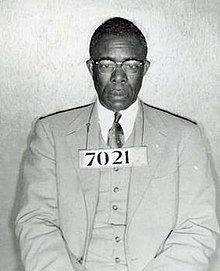This article needs additional citations for verification. (February 2018) |
E. D. Nixon | |
|---|---|
 1955 bus boycott arrest photo of Nixon | |
| Born | Edgar Daniel Nixon July 12, 1899 Montgomery, Alabama, U.S. |
| Died | February 25, 1987 (aged 87) Montgomery, Alabama, U.S. |
| Nationality | American |
| Occupation(s) | Union organizer, civil rights leader |
| Spouses |
Alease Curry
(m. 1927; died 1934)Arlet Campbell (m. 1934) |
| Children | 1 |
Edgar Daniel Nixon (July 12, 1899 – February 25, 1987), known as E. D. Nixon, was an American civil rights leader and union organizer in Alabama who played a crucial role in organizing the landmark Montgomery bus boycott there in 1955. The boycott highlighted the issues of segregation in the South, was upheld for more than a year by black residents, and nearly brought the city-owned bus system to bankruptcy. It ended in December 1956, after the United States Supreme Court ruled in the related case, Browder v. Gayle (1956), that the local and state laws were unconstitutional, and ordered the state to end bus segregation.
A longtime organizer and activist, Nixon was president of the local chapter of the National Association for the Advancement of Colored People (NAACP), the Montgomery Welfare League, and the Montgomery Voters League. At the time, Nixon already led the Montgomery branch of the Brotherhood of Sleeping Car Porters union, known as the Pullman Porters Union, which he had helped organize.
Martin Luther King Jr. described Nixon as "one of the chief voices of the Negro community in the area of civil rights," and "a symbol of the hopes and aspirations of the long oppressed people of the State of Alabama."[1]